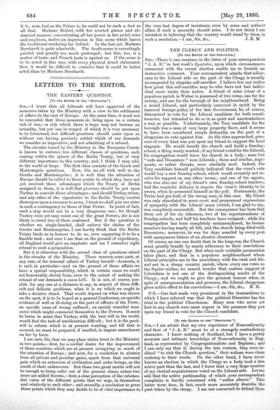LETTERS TO THE EDITOR.
THE EASTERN QUESTION.
[TO THE EDITOR OF THE "SPECTATOR.)
trust that all Liberals will have approved of the measures taken by the Ministry with a view to the settlement of affairs in the east of Europe. At the same time, it must not be concealed that those measures do bring upon us a certain risk of war,—a risk which there is hope may not become an actuality, but yet one in respect of which it is very necessary to be forearmed, lest difficult questions should come upon us without our having precisely settled which of our demands we consider as imperative, and not admitting of a refusal.
The circular issued by the Ministry to the European Courts
is known to embrace two different classes of questions, each coming within the sphere of the Berlin Treaty, but of very different importance to this country, and, I think I may add, to the world at large. The first class consists of the Greek and Montenegrin questions. Now, Sir, we all wish well to the Greeks and Montenegrins ; it is well that the attention of Europe should be called to those points in which they have not yet received those advantages which the Treaty of Berlin assigned to them, it is well that pressure should be put upon Turkey to concede those advantages ; and should Turkey refuse, and any other of the signatories to the Berlin Treaty resolve -thereupon upon a recourse to arms, I trust we shall join our arms in such a contingency to those of that Power. In point of fact, such a step would not be a very dangerous one; for though Turkey even yet may resist one of the great Powers, she is not likely to resist two of them combined. But if the question is mhether we, single-handed, shall enforce the claims of the Greeks and Montenegrins, I can hardly think that the Berlin Treaty binds us in honour to do so, even supposing it to be a feasible task ; and sure I am that on the ground of expediency, -all England would give an emphatic and (as I conceive) right refusal to such a proposition.
But it is otherwise with the second class of questions raised
in the circular of the Ministry. These concern some part, at any rate, of the internal affairs of Turkey herself—Armenia, it is said, in particular—and on the ground of those affairs we have a special responsibility, which in certain cases we could not honourably shrink from, even to the extent of making the refusal of our demands a mans belli. It is not, of course, pos- sible for any one at a distance to say, in respect of these diffi- cult and delicate problems, what it is on which we ought to take a decisive stand. That would depend on what was shown on the spot, it is to be hoped at a general Conference, on specific ,evidence of well or ill-doing on the part of offiaers of the Porte; on specific cases of wrong suffered ; on special remedial mea- sures which might commend themselves to the Powers. It must be borne in mind that Turkey, with the best will in the world, would find the task of amelioration difficult ; but it is the good- will to reform which is at present wanting, and till that is secured, we must be prepared, if needful, to impose amendment on her by force.
I am sure, Sir, that we may place entire trust in the Ministry in two points,—first, for a cordial desire for the improvement of those countries which are at present occupying so much of the attention of Europe ; and next, for a resolution to abstain from all private and peculiar gains, apart from that universal gain which an extension of civilisation and order brings, as the result of their endeavours. But these two great merits will not be enough to bring order out of the present chaos, unless two more are added thereto,—first, a clear perception of the substan- tial value of the different points that we urge, in themselves • and relatively to each other ; and secondly, a resolution to press those points which they may decide to be of vital importance to the very last degree of insistance, even by arms and without allies, if such a necessity should arise. I do not think I am mistaken in believing that the country would stand by them in such a resolution.—I am, Sir, &c., J. R. M.


































 Previous page
Previous page